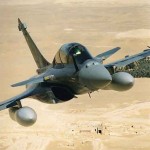On a scale of 1 to 10, an American editor of a defence newspaper told me that his threat perception on terror attacks inside the United States would merit an eight. A German minister rated it at four adding that war against terrorism was difficult to win “as they were far too many”. An Indian General engaged in fighting terrorism exported from Pakistan in Kashmir for past few decades responded nonchalantly with ‘May be two!’ These responses exhibit that farther the theatre of war, higher was the paranoia.
We have withstood the onslaught for the past two decades without nation’s morale plummeting while the West that joined the war on terrorism fairly recently is skeptical and despondent. On the other hand, the responses also show that the former imperial powers go for military overkill at the drop of a hat, while we on the other end of the spectrum, are so utterly reticent that even when our parliament is attacked, we display indecisiveness and inertia. The war against terrorism is indeed winnable provided these two extreme positions on the spectrum and the disparate strategic approach to the challenges posed by asymmetric warfare is reconciled.
It is not possible for any country including the super power to win this war on its own accord. Terrorism has not spared any continent including the geographically isolated Australia. Hence, basic cohesion is an imperative for victory over terrorism.
The jihadi forces irrespective of their state sponsors do not have the reach through blue water navies or air power.
By alienating China and Russia, who do not pose any near term threat, and going whole hog on Iran and North Korea-far too many sizzling agendas have been taken up simultaneously that are beyond the American capability. Ignoring and bypassing of the UN by the US have further exacerbated this. In any case, the US enjoys overwhelming influence and leverage over the world body and hence, it marginalizes its clout by making UN defunct.
Further, by opting for another military front in Iraq without consolidating the general area comprising of Afghanistan-Pakistan, which remains the epicenter of Islamic terrorism, Washington has been dissipating away its political, diplomatic, and military energies. In Iraq so far it has neither managed to lay its hands on the oil nor was able to establish democracy. In fact, on the oil front, Russia that was barely comfortable with oil prices pegged at US $ 22 a barrel, now enjoys economic boom with the current price of US $ 70-plus a barrel.
The Bush Administration unwittingly resurrected an old adversary giving the specter of the world being remodeled on the patterns of the Cold War era. On the other hand, today an American citizen who is so deeply wedded to his four-wheeler, ends up paying double the price for oil and gas, while many of the oil producing nations, flush with funds invest heavily in their irregular forces against the democratic societies.
The avowed objective of supplanting western model of democracy met stiff resistance due to cultural and social norms, as also compulsions of governance. Democracy cannot be sledge hammered into an alien society overnight. The US regime that insists on support to a dictator in Pakistan, who has forced two former prime ministers to live in exile – and is trying to push democracy down the throat of Iraq next door – is a huge contradiction and diminishes US credibility.
The wheel has made a full circle-ISAF and NATO is now pitted against the same irregular ‘jihadi‘ forces that they created to fight the Soviet might in Afghanistan. Pakistan is deploying them covertly to expel ISAF, NATO, and Karzai from Kabul while overtly extracting millions of dollars from America speciously in the aid of waging war against terrorism. The false excuse of WMD to attack Iraq and at the same time, overlooking proliferation activities by Islamabad provided adequate incentives to Iran to test the potency and efficacy of nuclear weapon agenda for self preservation and as a tool of diplomatic blackmail.





Actually, Sumit, K Subrahmanyam was the pioneer starting 1968 IIRC. Being his student was the defining point of my life: he taught me everything needed to wholistically under Indian national security. He was not interested in hard military details, but it didnt matter to me as I was. Bharat was the first, IIRC, to popularize military affairs for the masses.
🙁 With Capt Verma, we lost the pioneer who started military stretegic thnking in our country. His magic was to project everything in simple words…no complex military terms. he would alway put it straight & simple. Irreplacable loss:(